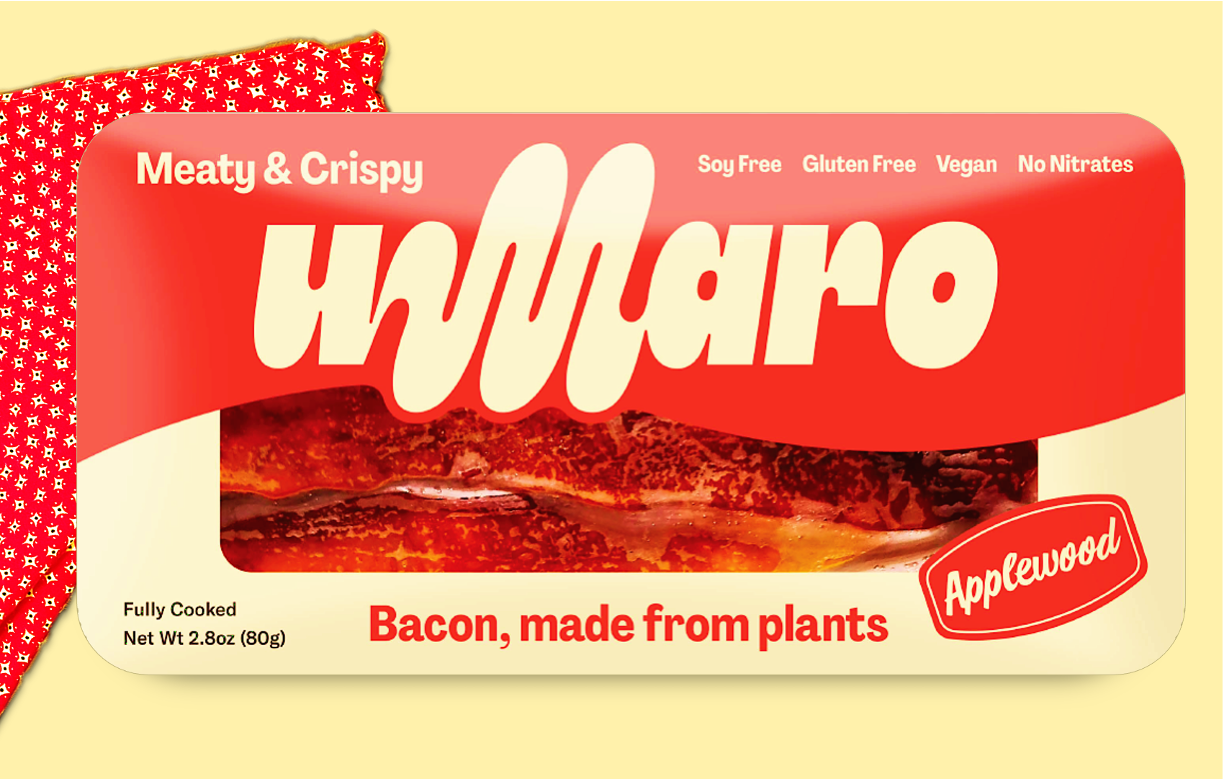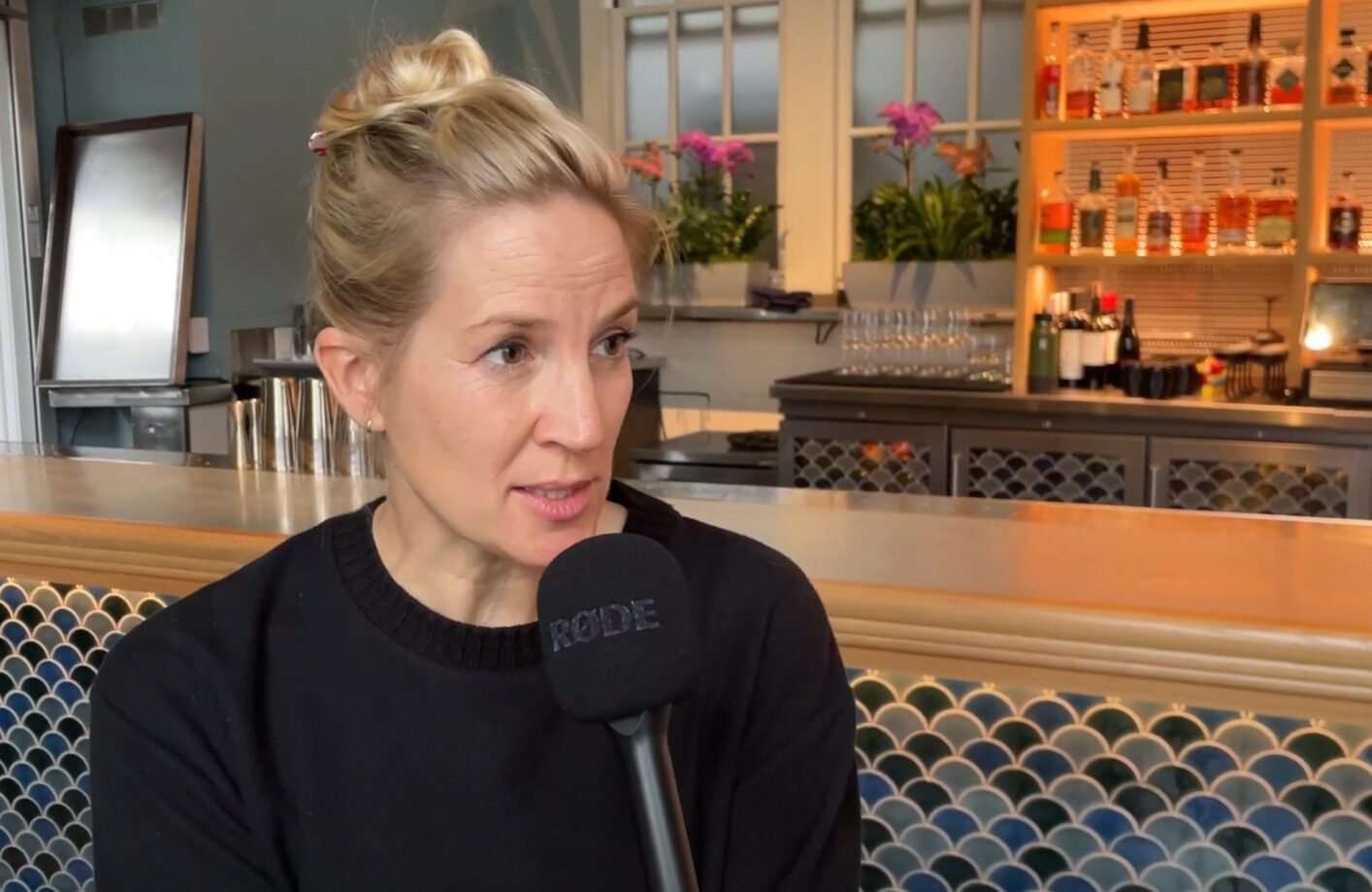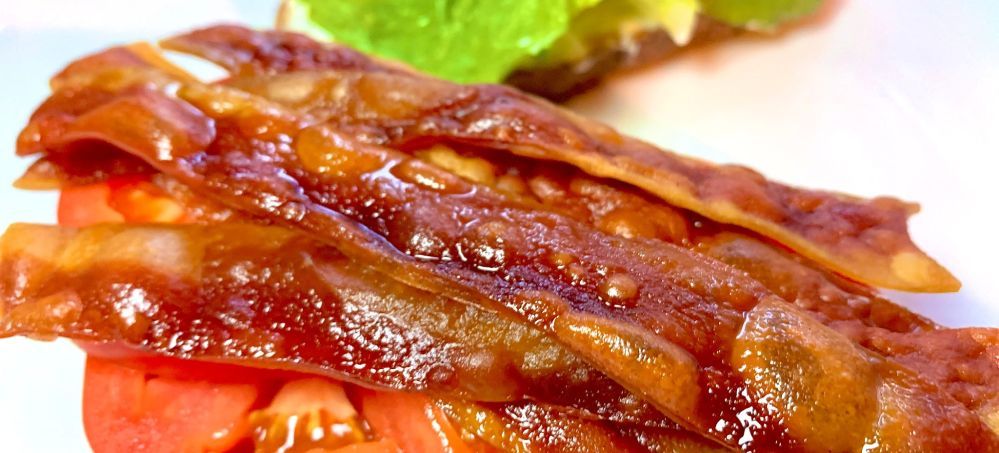[Disclosure: AgFunderNews’ parent company, AgFunder, is an investor in Umaro Foods.]
Umaro Foods has raised $3.8m in new financing including a seed 2 equity round led by AgFunder and grant funding as it gears up to launch its seaweed-based bacon into the retail market and switches from a batch to a continuous production process it claims will enable it to make bacon at half the cost of animal bacon.
The round—supported by Alexandria Ventures Investments, Climate Capital Bio, Ponderosa Ventures, and NBA all-star Chris Paul—will support the launch of retail products including bacon, a bacon, egg & cheese breakfast sandwich, and bacon bits.
It will also enable the Berkeley-based startup to scale a “high efficiency, low CapEx manufacturing process that will make bacon at half the cost of Hormel and Smithfield,” said CEO Beth Zotter, who cofounded Umaro (then known as Trophic) with Dr. Amanda Stiles (CTO) in 2019.
Umaro is currently working with around 250 restaurants and delis and is now in talks with universities about selling its bacon, said Zotter. It will debut shortly on the west coast with a leading food retailer.
“People love our bacon because it nails the crispy, fatty texture of pork bacon. Our innovative, seaweed-based formula is what differentiates our product from other brands and is now patented in the US. After achieving incredible traction in restaurants across the country, with sales growing sixfold in one year, we’re looking forward to reaching new customers.” Beth Zotter, cofounder & CEO, Umaro Foods

Capital efficient production process
“One of the things that makes meat alternatives very expensive is that they use techniques such as extrusion or fermentation that require large capital investments. We have a patented high throughput, low CapEx, manufacturing process that allows us to be cost competitive,” Zotter told AgFunderNews.
By moving from a batch to a continuous process, Umaro will be able to further reduce costs, she explained.
“To make our bacon, there’s an ingredient mixing step, a depositing step, a forming step, a cutting step and a dehydration step, but each process has not [historically] fed into the next step, so things have to be set aside or moved to a new location to get to the next process which is very typical in small-scale manufacturing.
“What we’ve been able to do is turn all those steps up to the dehydration stage into a continuous manufacturing line, which we’re installing as we speak.”
She added: “The dehydration process is still batch, so our next goal is to build a continuous dehydration system. The cool thing about our dehydration is that it allows the product to be shelf-stable. It’s also part of what gives the product its crispy texture.
“Based on our ingredient costs and manufacturing efficiency, we’ll be able to get to half the COGS of pork bacon with the machine we have now, which can do over a million pounds [of product] a year and [potentially] generate $20 million in revenue. So it’s essentially a matter of growing sales to where it’s operating at full capacity [currently Umaro is doing about 5,000lbs/month].
“It costs about half a million dollars to finance, so the payback time should be rapid. Our main goal in this next phase is to get to profitability. And this automated manufacturing process is going to be a key part of this.”
From a batch to a continuous process
“One reason bacon is so delicious is because it’s got a lot of fat… We’ve discovered a really innovative way to use the hydrocolloids in seaweed to hold on to high amounts of plant-based fat… That allows us to deliver that sensory experience that you get with bacon, which is what makes it so craveable.” Beth Zotter, cofounder & CEO, Umaro Foods
“Umaro’s results showcase its adaptability, innovation, and success in introducing new products to a competitive market, spanning both foodservice and retail. We are excited to continue supporting Umaro’s journey.” Sofia Ramírez Calvo, venture partner, AgFunder

‘The ocean is the world’s most scalable protein bioreactor’
Currently, Umaro works with a co-manufacturer in Canada to extract protein from seaweed imported from Korea. Longer term, said Zotter, the plan is to “move closer to the source of the raw material in Asia, and we’re looking for partners to scale that process, either via a joint venture or a manufacturing partnership. And that would be most likely with a large food processing company with a base in Asia.”
She added: “We have two different patent-pending extraction processes. The process for extracting protein from red seaweed shares some similarities to conventional pea and soy processing, whereas the process we’ve developed for brown seaweed protein extraction is quite different.”
Currently, Umaro is using nori seaweed protein “because it has this beautiful red color, it’s easy to import, and it’s very high in protein,” said Zotter. “But it doesn’t have those high-value hydrocolloids [which Umaro uses in its bacon to hold on to high levels of plant-based fat]. So our goal is to process both red and brown seaweeds, where we can get the protein out but also produce valuable side streams such as alginate, agar, and carrageenan, for which there are already established markets.
“So in the future, at scale, our protein separation process will also produce those hydrocolloids. I’m very excited about all the biomaterials innovations out there using seaweed-based hydrocolloids, but they need the materials to be supplied at higher volumes at a lower cost, and I think that’s the perfect marriage with our protein extraction process down the road.”
As for the seaweed protein, she said, “Right now our focus is using it to make our own bacon products, but we are in conversations with other companies and we’re open to B2B relationships down the road.”
She added: “The ocean is the world’s most scalable protein bioreactor. It covers 71% of the Earth’s surface and contains over 80% of the world’s chemically reactive nitrogen, so it’s sort of a no-brainer that that’s where we should be getting the bulk of our protein.”
Rare earth elements
Separately, Umaro Foods is working with chelation specialist HOPO Therapeutics to selectively extract rare earth elements and platinum group metals from seaweeds in a project backed by a $2 million grant from the US Department of Energy, said Zotter.
“The DoE is looking at seaweed as a source of critical minerals [as a less costly and energy intensive source than rocks], so they’re funding us to develop a way to integrate a minerals extraction process into our protein separation process.”
* Umaro Foods will be showcasing its new product at the Natural Products Expo West trade show in Anaheim, California (Booth 211) next week.





